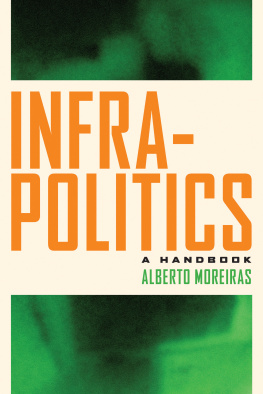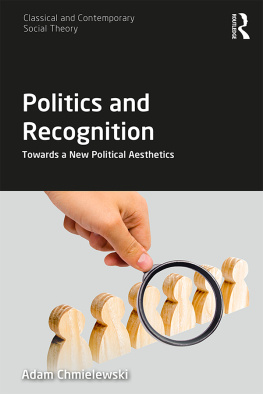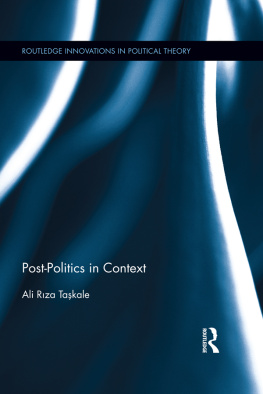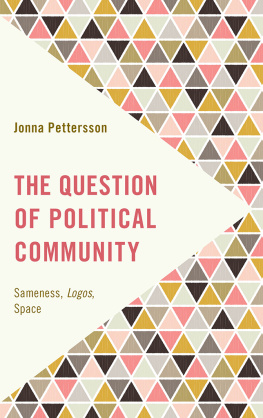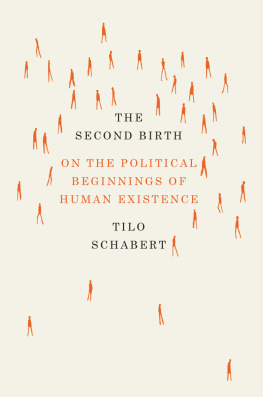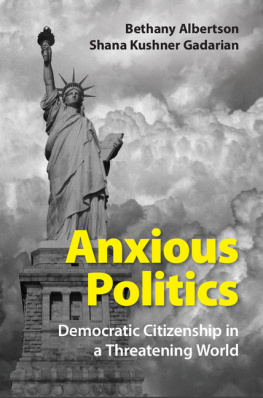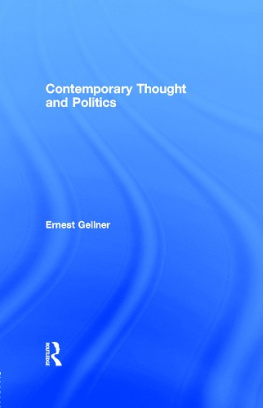Infrapolitics
A HANDBOOK
Alberto Moreiras
FORDHAM UNIVERSITY PRESSNEW YORK 2021
Fordham University Press gratefully acknowledges financial assistance and support provided for the publication of this book by Texas A&M University.
Copyright 2021 Fordham University Press
This book first appeared in Spanish as Alberto Moreiras, Infrapoltica: Instrucciones de uso, published by La Oficina, 2020.
All rights reserved. No part of this publication may be reproduced, stored in a retrieval system, or transmitted in any form or by any meanselectronic, mechanical, photocopy, recording, or any otherexcept for brief quotations in printed reviews, without the prior permission of the publisher.
Fordham University Press has no responsibility for the persistence or accuracy of URLs for external or third-party Internet websites referred to in this publication and does not guarantee that any content on such websites is, or will remain, accurate or appropriate.
Fordham University Press also publishes its books in a variety of electronic formats. Some content that appears in print may not be available in electronic books.
Visit us online at www.fordhampress.com.
Library of Congress Cataloging-in-Publication Data available online at https://catalog.loc.gov.
Printed in the United States of America
23 22 215 4 3 2 1
First edition
To my friends
Contents
Preface to the English-Language Edition
I first started using the term infrapolitics and reflecting on what it might mean in the early 2000s, which was a very different period in my life, not to mention my academic career. At the time I was preparing an earlier book, Lnea de sombra: El no sujeto de lo politico, which appeared in English only in the form of a few articles dispersed in various places. It is easy, retrospectively, to state that Lnea already included some intuitions that would lead me down the path of thinking more consistently about infrapolitics, but an interruption in my life, and a general change in my approach to things, caused a number of delays, as well as disenchantment, even boredom, with the idea of writing books, particularly books that would validate my presence in the field of Latin American studies, which is all I had attempted to do up until that period, with uneven success.
I started experimenting with a different sort of writing, on social networks and blogs, while keeping up the work of preparing conference papers to keep in touch with colleagues. I suppose the curious reader could check out the blog called Infraphilosophy (http://www.infraphilosophy.com) to see, if not the progress of my thinking, at the very least the problems into which I decided to immerse myself. There are other texts even the curious reader may not see. But I make no grand claims. As Reiner Schrmann says, in order to think about certain things, a certain way of life is required (Heidegger on Being and Acting, 287). To engage (intimately) in that alternative way of life, in that alternative understanding of time and work, which I have found hard to do, has been my main preoccupation over the last ten years. And counting. Infrapolitics is nothing if it does not lead to a change in form of life, and for the better, of course. But it is a long path, and for the most part a silent one as well.
Eventually I came around to the decision that writing a few more books could be good for me, if not necessarily for others. This is inevitably one of them. A certain curiosity developed among a narrow circle of friends, together with a generous insistence that I write this book, which was easier said than done. In fact, I can date the beginnings of a plan to a precise moment in the summer of 2014, at a hotel bar in Madrid, when Angel Octavio Alvarez Sols told me in no uncertain terms that he expected me to do it. But first I needed to finish off a number of projects that had been worrying me, which have been coming out over the last few years. of Infrapoltica: Instrucciones de uso. Arturo got stuck with a longer text than he had bargained for, and which is, except for this preface and a few revisions, the Spanish version of what you hold in your hands.
I suppose it is fair to say that the idea of infrapolitics developed as an obscure consequence of my engagement with what was called subaltern studies in the 1990s. For many of my colleagues (not all), subaltern studies was nothing but political thinking, but some of us started wondering at a fairly early point if politics, or at any rate political talk, was all subaltern studies could do. The problem for those of us engaged in the discipline known as Latin American studies, especially within the humanities, was compounded by the fields radical resistance to theory. I have discussed elsewhere some of the problems the Latin American Subaltern Studies group had (see my Against Abstraction, 2229, 11517), and I do not wish to repeat myself. Let me just say that the group was partially committed to good old leftist work in the political sense, more or less in the radical leftist style of post-1968 social democracy, which was all right with the rest of us, of course, as far as it went. Or else to what later came to be known as decoloniality, an exercise in cultural critique from a range of extreme particularisms that was perhaps not as all right, given some of the claims that were made.
When we started to insinuate, timidly, that perhaps politics was not all there was to it, we did not mean that we should all therefore exclusively engage in culture or the study of culture or claim infinite decolonization as the ultimate goal of our work. This was the time of the dominance of the cultural studies paradigm, you must remember, which had its own problems, and from which we wanted to achieve some distance. Rather, we wanted to think about subaltern existence, and that meant not just the cultural existence of those confined to disenfranchised sectors of the population, but also everything in the experience of existence that could be deemed to have been subalternized by hegemony in any of its forms. Yes, we knew, there is also an existential form of hegemony, not merely political, not merely cultural, poignant and most unrecognized, even though it absolutely determines our everyday life through its imposed regime of constitutive exclusion, which is always to our experiential and existential detriment. But rejecting hegemonic forms of discourse, even those that thought of themselves as directly counterhegemonic (which we had some tangible reasons to doubt), and doing it from a marginal field like Latin American studies could not happen without a price. Some of us have paid the price through soft marginalization, silencing, a relative social exclusion from the field, which is ironic to the extent those are the very things we fought against when we fought hegemony. We should be at peace from now on, though who knows what the future will bring.
The Anglo-American reader might be hard put to care about what a small group of mostly expat Spanish-speaking academics, with some choice accomplices from elsewhere, might have to say. Their intellectual commitments vary, certainly, but their search beyond subaltern studies finds parcels of common ground in post-Marxism, deconstruction, and an interest in Lacanian analysis. And of course there is our common primary language, in some cases the only language of our professional commitment, with its vast if somewhat theory-deficient archive. In any caseI no longer remember the exact date, but I remember very well the Texas night, on the back porch of our house by the lakeSergio Villalobos-Ruminott suggested that we create a study group on infrapolitics. After he said itin the presence of others who were in Texas for a conference I had organized: Gareth Williams and Jaime Rodrguez Matos, Gerardo Muoz and Maddalena Cerrato, Peter Baker, Michela Russo, Teresa Vilars, Ronald Mendoza de Jessit became the obvious thing to do. So we did it: we created the Infrapolitical Deconstruction Collective, and othersJorge Alvarez Ygez, Humberto Gonzlez Nez, Benjamn Mayer Foulkes, Gabriela Mndez Cota, Jon Beasley-Murray, Angel Octavio Alvarez Solsjoined. We had a lot of fun with it during the few years that it lasted, but it ended, fortunately without conflicts, which is not always the case with these adventures. In the meantime, people were thinking of infrapolitics, and deconstruction, and deconstructive infrapolitics and infrapolitical deconstruction, in any way the devil led them. A number of publications followed, including, just a few months ago, the first full book in English, Gareth Williamss

